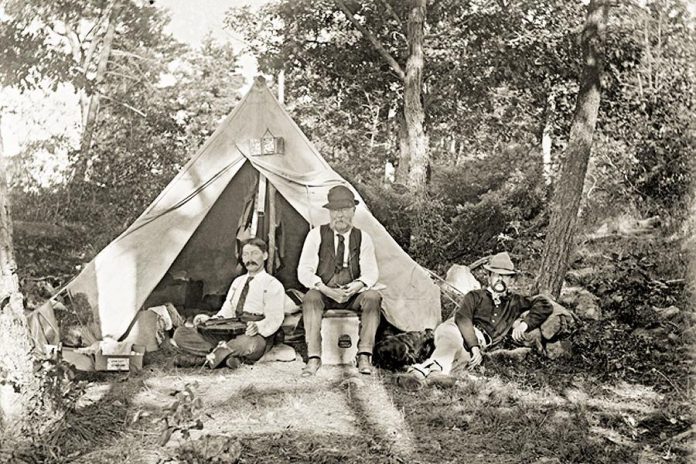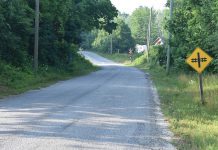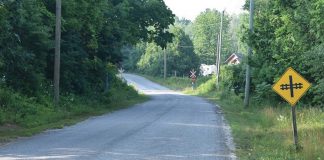
When Robert Boudreau, Micky Renders, and Bill Lockington first imagined a photo festival for Peterborough, they never dreamed the first “frame” would be as successful as it was.
Even the highly successful Contact Photography Festival in Toronto drew just 50 exhibitors in its first year; the SPARK Photo Festival boasted 47 in its first year in 2013.
“I kind of laugh about that,” Robert chuckles. “We came so close to beating them. Now, of course, the Contact festival is the largest in the world, with over 1,000 exhibits.”
Robert laughs, but there’s an inner grin that he can’t wipe away. He says he was not only surprised but delighted with the first-year success of SPARK.
“The goal was to have 30 exhibits. We had 47. I really wasn’t expecting it would create the sort of excitement it did. That was really gratifying,” he says.

The festival has drawn 67 exhibitors this year. Some of the names will be familiar: Kenneth Powell, Bill Lockington, Bruce Gibson, George Dimitroff, Karl Asta, and Robert himself. Their day jobs range from dentistry to hairdressing, and far beyond.
Photography unites them, and the SPARK Photo Festival, with free exhibits all over the city, displays some of their most exquisitely intimate art to an eclectic audience of photography buffs, art admirers, community supporters, and, indeed, anyone interested in the human condition.
Focus 2014: A Visit by Renowned Photographer Edward Burtynsky

So it is with a photography festival. You make it, by massaging good ideas into better ones. Government grants for arts festivals can be small, and innovative fundraising is often necessary.
While a grant from Community Futures helped SPARK get off the ground last year, Robert knew he had to do more to keep the festival afloat for years to come. Having a connection to the Contact Photography Festival proved to be most useful.
As he tells the story, Robert went to Toronto to meet with the director of Contact, and while chatting about fundraising ideas, he whimsically asked “You mean we should bring in Ed Burtynsky?”
Before Robert could wipe that semi-sarcastic grin off his face, the director of Contact said “Yeah. That’s just what should happen.”

Ed Burtynsky is an internationally recognized, award-winning photographer and film-maker. His work is collected by more than 50 of the top museums and galleries in the art and photography worlds.
Not only has he agreed for his award-winning film WATERMARK to be screened at Market Hall on March 31, but he is also attending that screening to talk about his film, and will host a private dinner at Elements Restaurant.
WATERMARK is a study of man’s relationship to water and how man impacts water around the planet — Brutynsky’s work is always about the relationship between man and his natural world.
In Brutynsky’s own words, the film began with these questions: “How does water shape us and how do we shape water?” It a journey into 10 countries, told in 20 stories, through the lens of a photographer whose eye for the sublime goes beyond the lens of a camera.
Tickets to WATERMARK are selling fast. “This is the fastest-selling movie they’ve ever had on their list at Market Hall,” Robert notes.
While they’re still available, you can order tickets by calling the Market Hall Box Office at 705-749-1146 or by visiting www.markethall.org.
WATERMARK Trailer
Beyond the Exhibits: Festival looks to a regional future

This year, among many other moderately priced sessions, the festival offers a workshop for children ages 9 to 12, and a new two-day on-location workshop at Golden Pathways Bed and Breakfast — designed to attract people from outside Peterborough to the festival.
According to Robert, that’s part of the future scape of the SPARK Photo Festival. “Eventually we want to be known as a regional festival,” he says.
This year is the beginning of that, with two exhibits in Northumberland and seven in Lakefield.
“Lakefield has gone kind of wild,” Boudreau laughs again, with a smudge of seriousness. “This whole regional thing — we’ll get there. But my vision is that it will be five or six years before we truly encompass the whole area.”
And by “whole area”, Boudreau means Peterborough, Northumberland and the Kawarthas, including Haliburton.
A Photographic Heritage

“Peterborough is blessed with a wealth of heritage photographic collections and we’ve really only touched the surface of those,” Robert says.
He stumbled on this year’s collection while he was at Trent Valley Archives (TVA) discussing the potential of using the Peterborough Examiner collection recently donated to the archive.
It was so massive that Robert thought it might be too much to take on.
“It just so happened that, as we were out there meeting with TVA staff, a couple of boxes came in the door that were donated by a fellow in Lakefield, Blair MacKenzie,” he explains.
The boxes contained about 200 glass plate negatives from the turn of the century.
“They are amazing photographs … just amazing photographs,” Robert says.
Attributed mostly to Jack Fairbairn and his wife Hannah, they include what Robert calls the “most remarkable pictures of Stoney Lake that you’ve never seen before.”
The collection can be seen at the old YMCA building in Peterborough throughout the month of April.
Juried Exhibit to Shock and Inspire
Alongside the Heritage Collection at the old YMCA, the new Juried Photo Exhibit will be on display.
As Robert tells it, the work that came through the door for this contest under the theme “Spaces” inspired by Liz Fennel of Gallery in the Attic, was “just outstanding.”
“The creme de la creme,” he calls it. “The creativity people showed was remarkable.”
Thirty of the 100 entries will be on display.
Recognizing Young Photographers

“It’s so cool to see young people get involved and to use photography to express themselves,” Robert says, highlighting the youngest photographer — 12-year-old Mackenzie Vaughan-Graham — who will display his work at The Chocolate Rabbit in Lakefield. “It’s such a great medium for people to express themselves.”
With something for the old, the young, the new, and the seasoned, Robert describes the festival as taking “baby steps” and exercising patience as it moves toward its goals.
But new this year — perhaps a second or third pinnacle achievement for the festival — is an overall photography award sponsored by NuWork Magazine (www.nuwork.ca), a large-format art magazine. The winning photographer, chosen by the editorial staff of the magazine, will have his or her work published in the magazine.

Robert is excited about photography, but he’s more excited about sharing photography.
The SPARK Photo Festival is his chance to help shape the way we see our community, the way we interact, the textures we live among, and the futures we can shape.
The festival runs from April 1st to 30th. A complete listing of events, venues, and workshops is available at www.sparkphotofestival.com.
Images are copyright protected and have been reproduced here with the permission of the photographers. Not for download or reproduction.


























